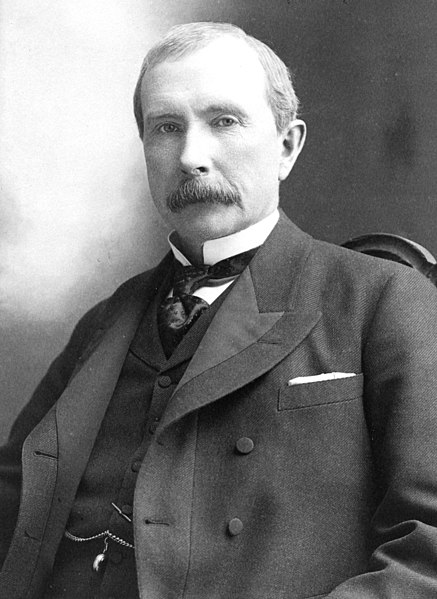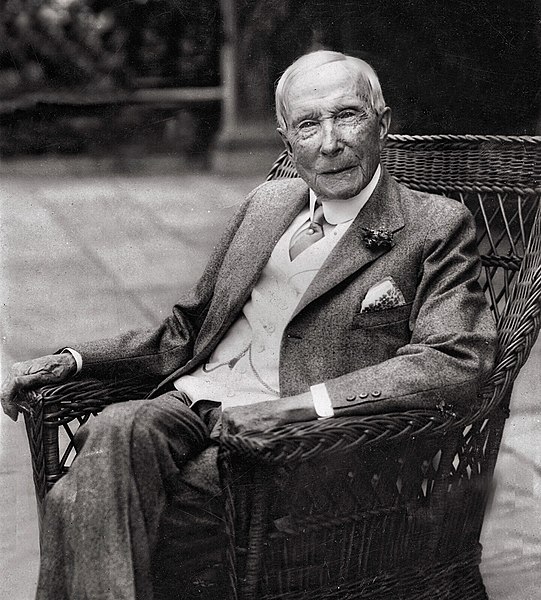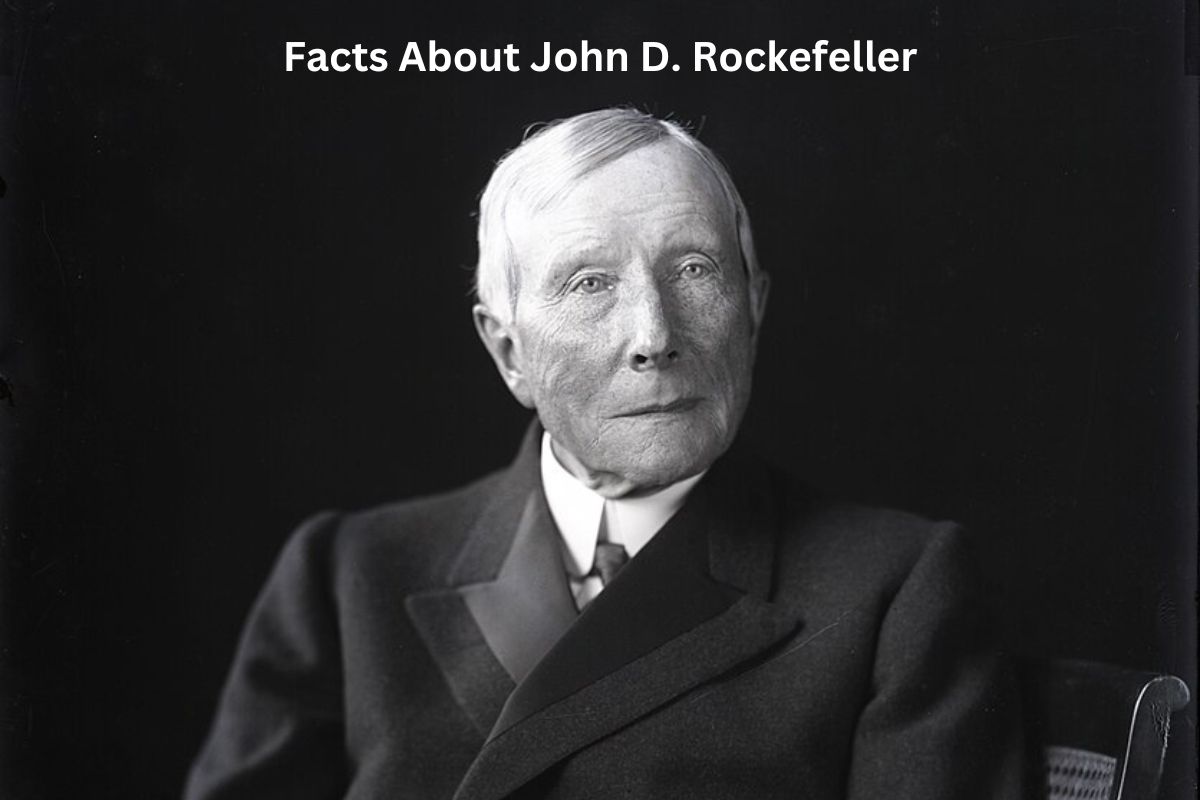John D. Rockefeller, born in 1839, was a pivotal figure in American history. He co-founded the Standard Oil Company, which became a dominant force in the oil industry, amassing immense wealth.
Rockefeller’s legacy extends beyond his business success; he established the Rockefeller Foundation, dedicated to philanthropy, and played a role in shaping education and public health.
Despite his achievements, his business practices led to antitrust action, resulting in the breakup of his company. This complex legacy has left an indelible mark on both American business and philanthropy.
John D. Rockefeller Facts
1. Born on July 8, 1839, in Richford, New York
John Davison Rockefeller was born into a modest family in upstate New York. He was the second of six children. His early years were marked by frugality and a strong work ethic, which would later become hallmarks of his business career.

2. Co-founder of the Standard Oil Company in 1870
Rockefeller’s pivotal moment came in 1870 when he co-founded the Standard Oil Company with his brother William, Samuel Andrews, Henry Flagler, and several others.
Also Read: Accomplishments of John D. Rockefeller
At the time, the oil industry was in its infancy, with numerous small, inefficient, and often wasteful oil producers. Standard Oil aimed to consolidate and streamline the industry’s operations, making it more efficient and profitable.
3. Standard Oil became a powerful monopoly in the oil industry
Under Rockefeller’s leadership, Standard Oil grew rapidly and adopted aggressive business practices such as undercutting competitors’ prices, negotiating favorable deals with railroads for transportation, and acquiring rival companies.
These tactics, along with careful cost management and strategic investments in infrastructure, allowed Standard Oil to dominate the oil industry in the United States.
Also Read: J.P. Morgan Timeline
By the 1880s, Standard Oil controlled nearly 90% of the country’s oil refining capacity. This level of dominance led to accusations of monopolistic practices and anti-competitive behavior.
As a result, it became a subject of public and government scrutiny, ultimately leading to a series of legal actions and the company’s eventual breakup in 1911, when it was deemed in violation of antitrust laws.
The dissolution of Standard Oil resulted in the creation of numerous smaller oil companies, some of which have evolved into major oil corporations that are still well-known today, including Chevron and ExxonMobil.
4. Rockefeller was the richest person in modern history
John D. Rockefeller’s business acumen and the success of Standard Oil made him extraordinarily wealthy. At the height of his fortune, he was widely considered the richest person in modern history and one of the wealthiest individuals in the world.
His net worth was estimated to be worth billions of dollars, adjusted for inflation.
Rockefeller’s immense wealth allowed him to wield significant influence in both business and philanthropy. His fortune became a symbol of the Gilded Age in the United States, characterized by the extreme wealth of a few individuals amid widespread economic inequality.

5. Established the Rockefeller Foundation in 1913 for philanthropy
After retiring from active business pursuits, John D. Rockefeller turned his attention to philanthropy. In 1913, he founded the Rockefeller Foundation, one of the largest and most influential philanthropic organizations in the world.
The foundation’s mission was, and continues to be, the promotion of the well-being of humanity through various initiatives.
The Rockefeller Foundation has funded numerous projects and initiatives aimed at addressing global challenges, including public health, education, scientific research, and social development.
It played a significant role in the development of medical research and public health programs, including support for the discovery of the yellow fever vaccine and contributions to the Green Revolution in agriculture.
6. Supported education, including the University of Chicago
John D. Rockefeller had a strong belief in the transformative power of education. He provided substantial funding to various educational institutions, with one of the most notable being the University of Chicago.
In 1890, he made a substantial donation that helped establish the university. Rockefeller believed that education could lead to social progress and economic development, and he wanted to make quality education accessible to more people.
His philanthropic contributions extended beyond the University of Chicago to support other universities, colleges, and educational programs across the United States. Rockefeller’s commitment to education and his generous financial support left a lasting legacy in the field of higher learning and research.

7. Lived to be 97 years old, passing away in 1937
John D. Rockefeller lived a remarkably long and healthy life, especially for his era. He passed away on May 23, 1937, at the age of 97.
His longevity was attributed to his disciplined lifestyle, including a well-balanced diet, regular exercise, and access to top-notch healthcare. His advanced age made him one of the oldest prominent figures of his time.
8. Was a teetotaler (abstained from alcohol) and a Baptist
Rockefeller was known for his strong personal beliefs and values. He was a teetotaler, meaning he abstained from consuming alcoholic beverages throughout his life. This abstention was in line with his commitment to a healthy lifestyle and strong sense of self-discipline.
Additionally, Rockefeller was a devout Baptist. His faith played a significant role in his life, influencing many of his philanthropic decisions. His religious beliefs were a driving force behind his commitment to giving back to society and improving the well-being of others through his philanthropic endeavors.
9. His legacy includes both immense wealth and philanthropy
John D. Rockefeller’s legacy is multifaceted. On one hand, he is remembered for accumulating immense wealth during his lifetime, becoming one of the richest individuals in history. His success in the oil industry and his business practices left an indelible mark on the history of American capitalism.
On the other hand, his philanthropic legacy is equally, if not more, significant. Through the Rockefeller Foundation and other charitable efforts, he directed a substantial portion of his wealth towards improving public health, education, scientific research, and social welfare.
This dual legacy of wealth accumulation and philanthropy has shaped how he is remembered in history.
10. His business practices led to antitrust action and the breakup of Standard Oil in 1911
Despite his success, John D. Rockefeller’s business practices and the dominance of Standard Oil in the oil industry faced increasing scrutiny and legal challenges. The company’s anti-competitive tactics, including price manipulation and acquisition of competitors, led to concerns about its monopoly power.
In 1911, the U.S. Supreme Court ruled that Standard Oil was in violation of antitrust laws and ordered its dissolution. This landmark case resulted in the breakup of the company into smaller, independently operated entities. Some of these entities, like ExxonMobil and Chevron, still exist today.
The breakup of Standard Oil marked a significant moment in the history of antitrust regulation in the United States and set a precedent for addressing monopolistic practices in various industries.
